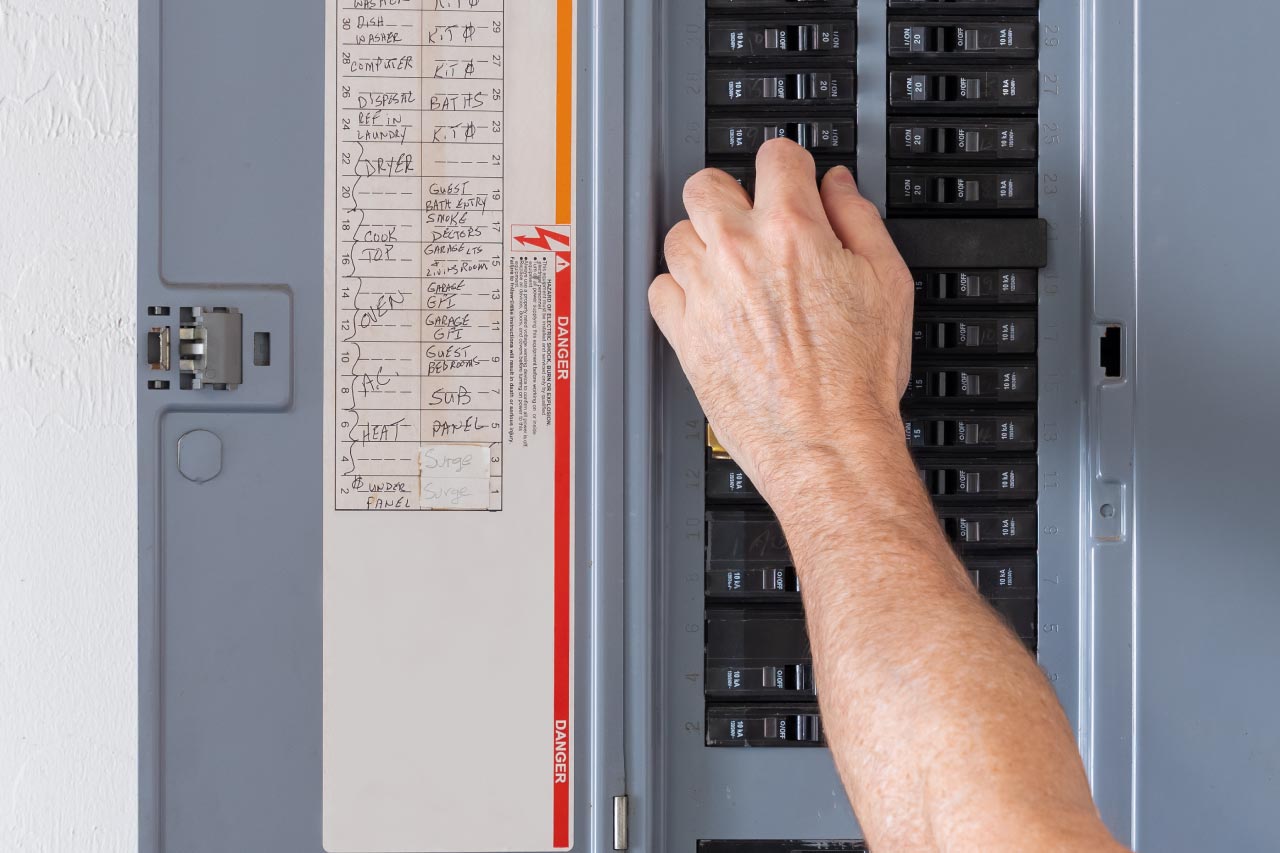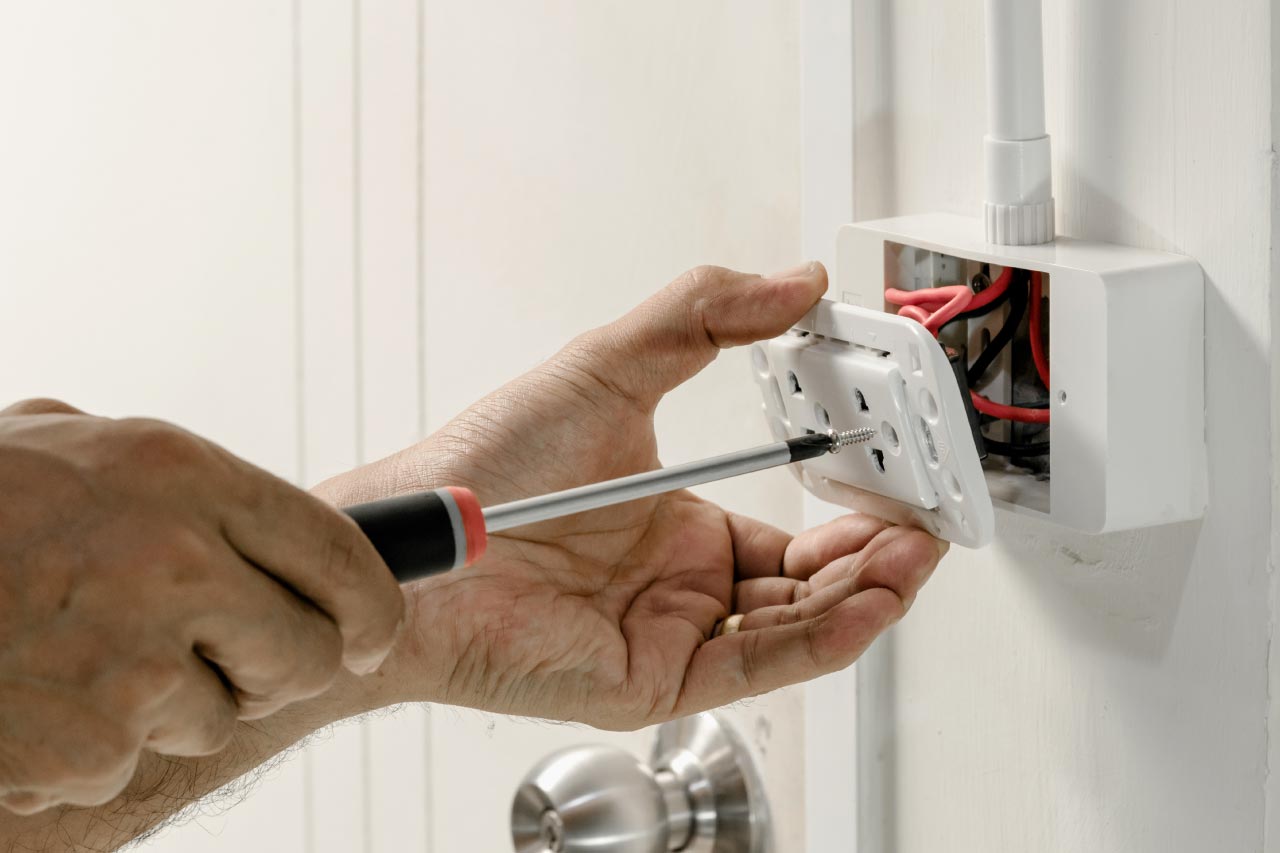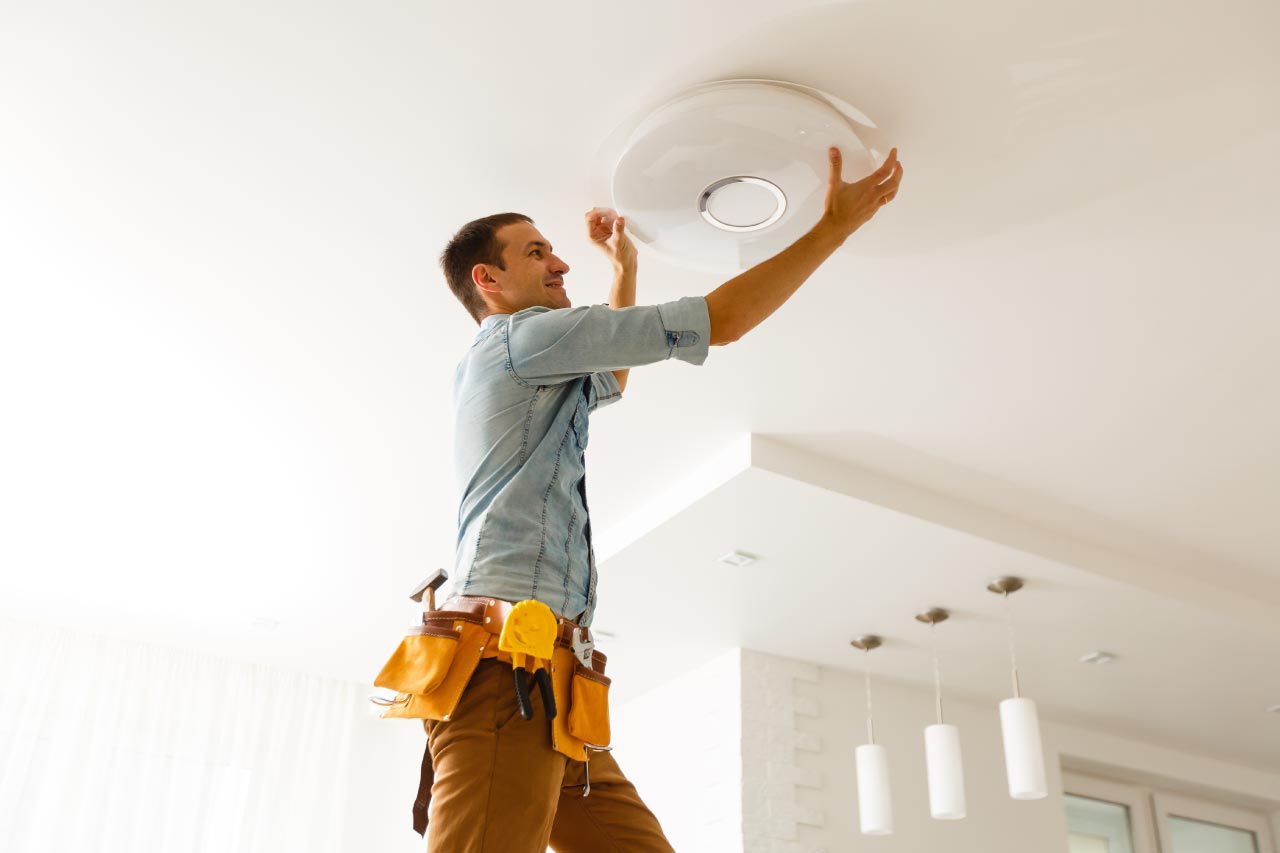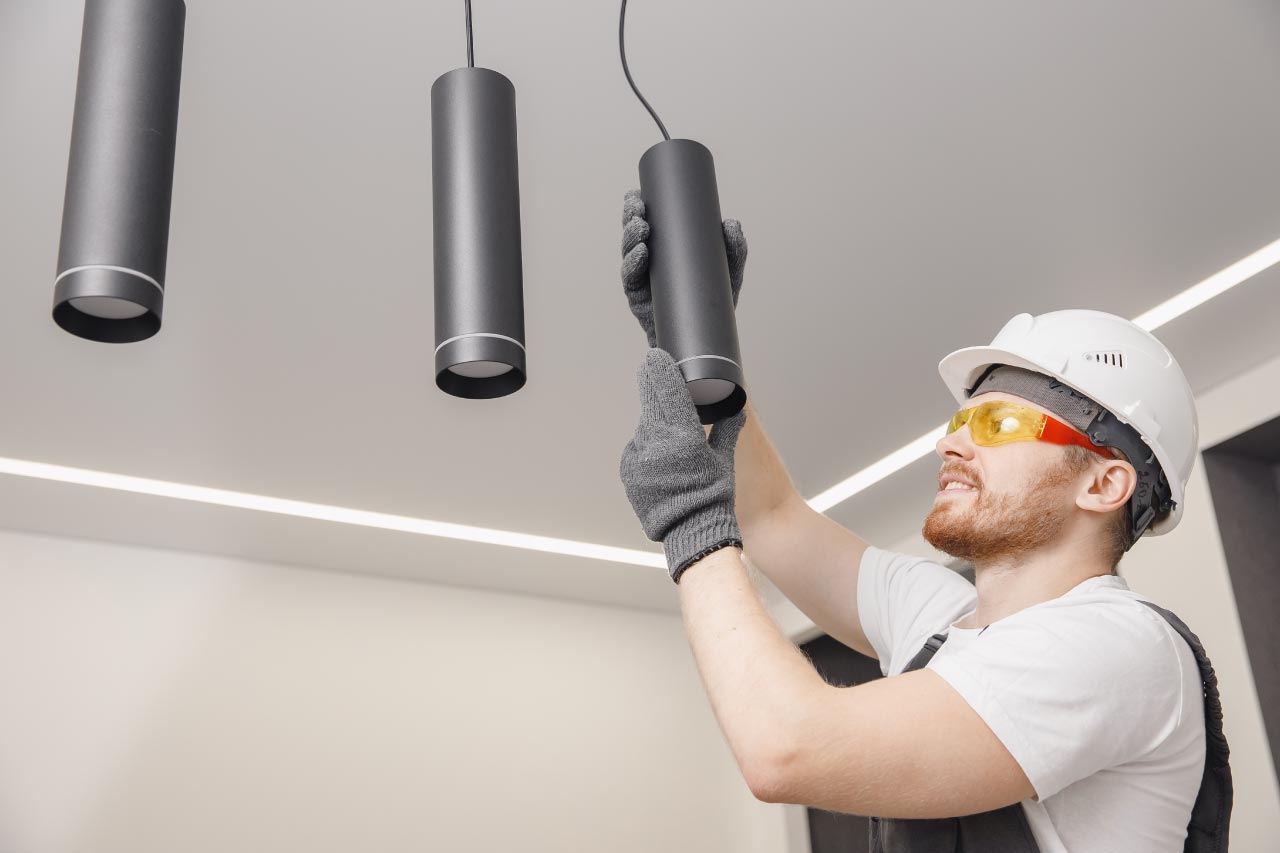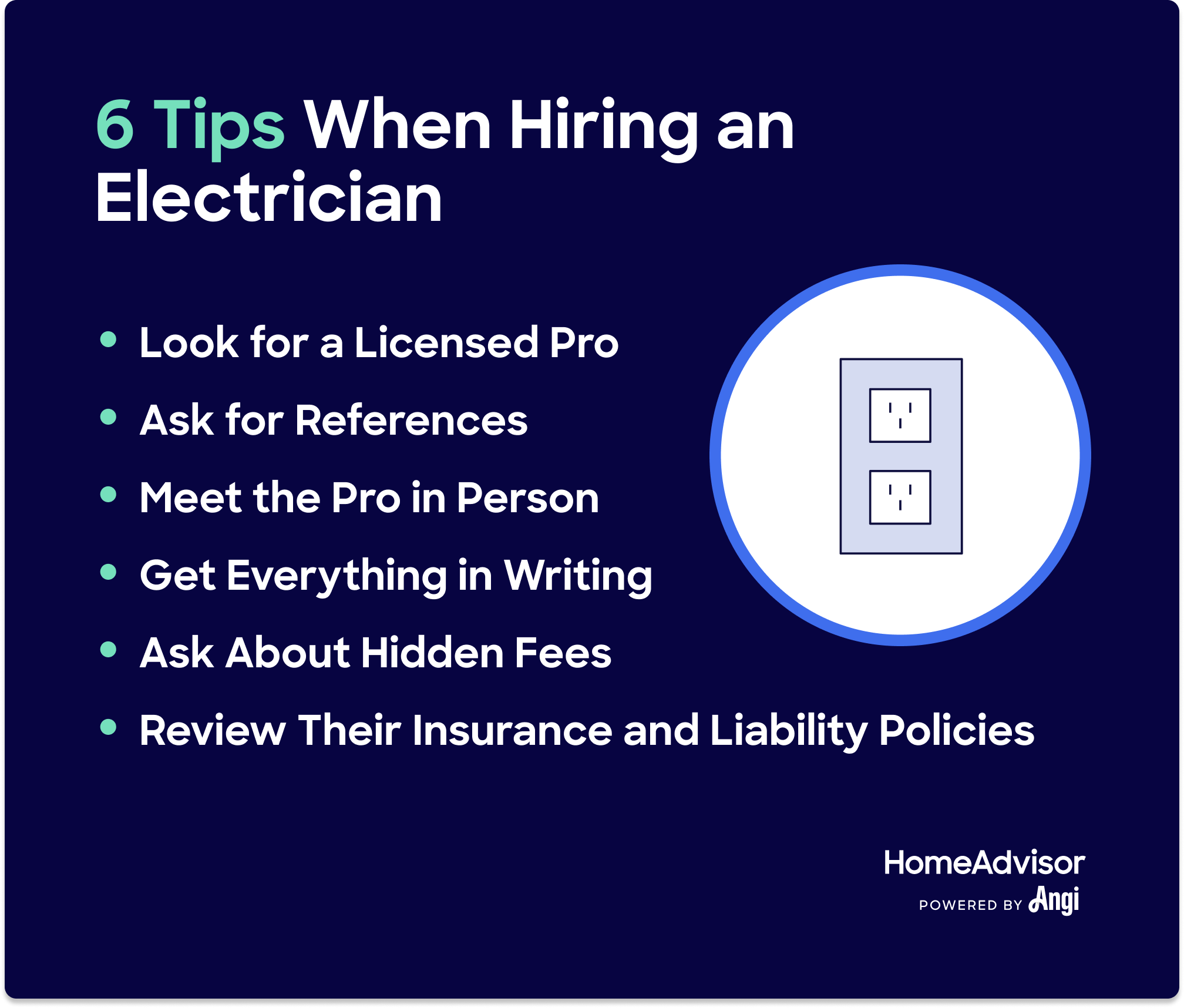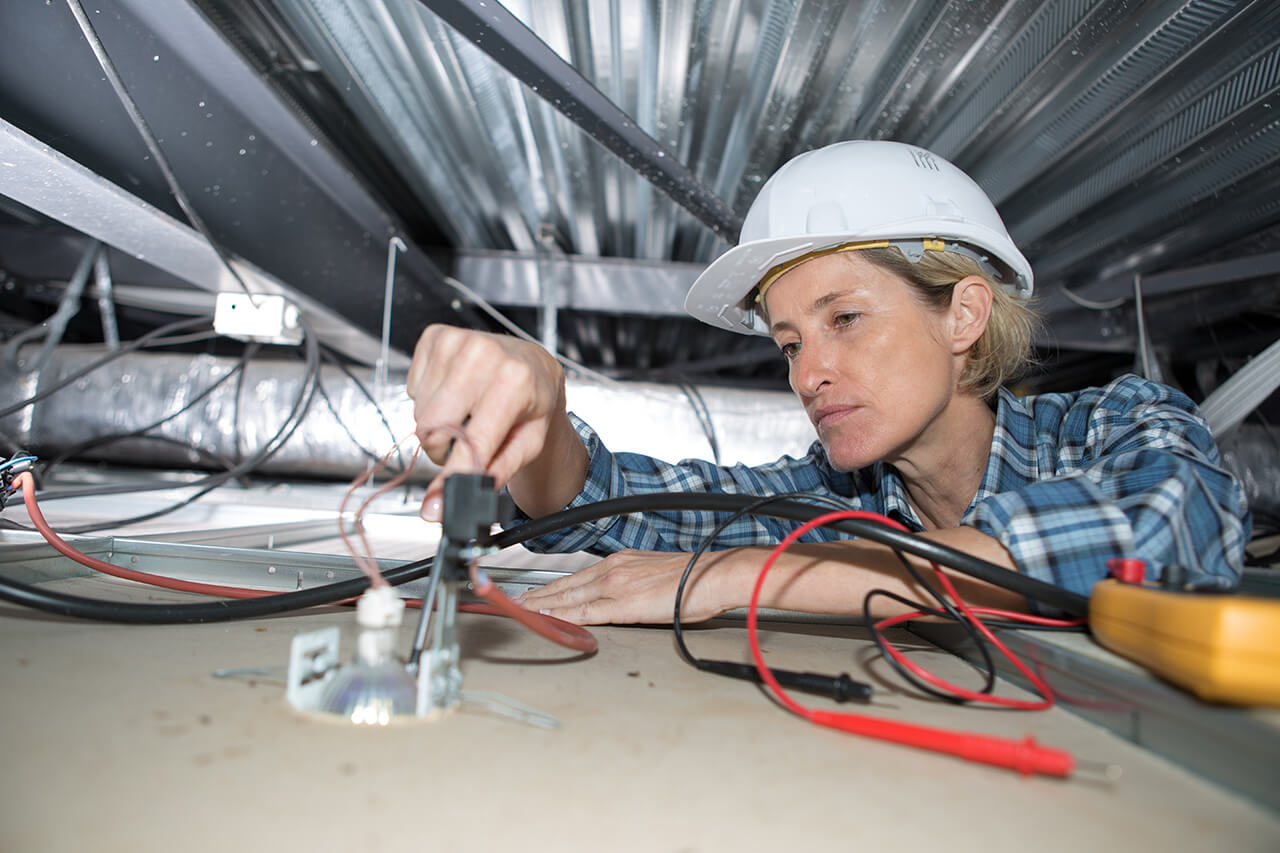How Much Does It Cost To Hire An Electrician?
Typical Range:
$163 - $536
Typical Range:
$163 - $536
Cost data is based on actual project costs as reported by 98,068 HomeAdvisor members. Embed this data
.
.
.
.
.
.
.
.
.
.
.
.
.
.
.
.
.
.
.
.
.
.
.
.
.
.
.
.
.
.
•
•
•
•
Updated April 16, 2024
Reviewed by After Hours Home Improvement, LLC, Reid Gravitte, Certified Electrician, Plumber and HVAC Specialist.Hiring a pro electrician ensures adherence to safety, experience in complex tasks, and knowledge of local regulations.
Electrician hourly rates range from $50 to $100, plus additional costs for parts and call-out fees.
The project cost is impacted by the electrician's experience level, license type, job complexity, and location.
The project benefits include ensuring electrical system safety, preventing potential damage, and saving on energy bills.
Highlights were summarized from this existing cost guide text using automation technology and were thoroughly reviewed for accuracy by HomeAdvisor Editor Ryan Noonan.
Most homeowners pay a typical range of between $163 and $536 for an electrician to visit their home and complete electrical repairs, or an average cost of $348. Both hourly and project rates vary depending on the project type, license, and service provider experience.
Let's calculate cost data for you. Where are you located?
Where are you located?
| National Average | $348 |
| Typical Range | $163 - $536 |
| Low End - High End | $85 - $1,115 |
Cost data is based on actual project costs as reported by 98,068 HomeAdvisor members.
The hourly rate for an electrician can range anywhere from $50 to $100. This doesn't include additional costs for parts and call-out fees, which range between $25 and $75. The exact amount it'll cost to hire an electrician will depend on their experience level, license type, and job complexity.
There are three types of electricians: apprentice, journeyperson, and licensed master. Each increasing grade requires more knowledge, experience, and testing, which all translates into higher rates. The specific requirements for each grade, including years of experience, vary by state.
| Type of Electrician | Average First Hour Rate | Average Hourly Rate |
|---|---|---|
| Master | $150+ | $100 |
| Journeyperson | $65+ | $55 |
| Apprentice | $65+ | $40 |
Apprentice electricians are just starting out and might not be licensed. They work with a mentor, who can be a journey-level or master electrician, learning the trade as they go. Apprentices can’t work unsupervised but can perform some limited and light duties under the watch of their mentor. The apprenticeship can last anywhere from two to six years.
Journey-level electricians have typically undergone apprenticeships and met their state or local government's electrician licensing requirements. They can work independently without supervision. They're also licensed to install electrical wiring, apparatus, and equipment and can supervise apprentices.
This is the highest tier of electricians, so they usually have the most experience and knowledge. Master electricians have succeeded in the journey-level role for at least two years (four years in some states) and demonstrated understanding of the National Electrical Code by passing the Master Electrician exam. They can perform nearly all types of electrical work and on all kinds of electrical systems.
Service calls, or any job that needs a diagnosis, typically cost between $50 and $100 per hour. However, homeowners usually pay more for the first hour, up to $150. The higher rate for the first hour is because it includes a minimum call-out fee of between $25 and $75. The call-out fee is the fee charged for calling the electrician to come to your house to attend to an issue. This fee will cover gas, travel time, and small parts (large parts will be billed separately).
Consultations and inspections are both considered service calls and priced similarly. Estimates to fix already identified issues are usually free. Some electricians might also bill you an hourly minimum (e.g., two to four hours), even if they complete the job in less time.
Since you may be paying a minimum fee just for a visit, it's best to get a quote for all the tasks you want completed at once. Do a quick walk-through of your home to list everything that needs attention before you call in the pro. This will save you time in terms of how many visits an electrician needs to make, as well as money since you'll only have to pay for one call-out fee.
| Electrician Service | Average Cost |
|---|---|
| Rough-in for a new structure | $180 per hour for two pros |
| Electrical panel upgrade | $550 – $2,000 |
| Generator services | $250 – $8,100 |
| Outlet and switch/socket installation | $100 – $300 |
| Wiring a house | $3 – $10 per square foot |
| Light fixture work | $150 – $900 |
| Electrical breaker | $100 – $160 |
| Attic fans | $400 – $900 |
| Ceiling fans | $150 – $350 |
| Smart home installation | $180 – $1,450 |
| Inspection | $100 – $400 |
Electricians hired to install rough-in electrical for a new structure will charge per hour or a flat rate based on the electric plan. The rate per hour averages $180 for two pros. The number can vary widely for flat rates, depending on the house size and specific plans.
Upgrading an electrical panel costs between $550 and $2,000 but can go as high as $4,000. Prices vary depending on the extent of the upgrade (200 amp to 400 amp, for example) and the wiring length needed.
Installing a generator costs between $1,400 and $8,100, but repairing one will only cost you about $250. Generators have many benefits, including providing power in the event of extended power outages. They can also be a great investment if you’re living off-grid or operating a recreational vehicle.
A single outlet or receptacle only costs a few dollars. But with the minimum service call fee that’s usually included with the rate of the first hour, installing an electrical outlet costs between $100 and $300. Installing a light switch costs a little less than $150 on average. To get more value for your money, it’s best to combine these simple repairs with other work.
Updating the electrical wiring in your house costs $6 to $10 per square foot on average. The costs may be higher or lower, depending on how accessible the wiring routes are.
If the area for new wiring is easily accessible, such as during a remodel when the walls are open, electrical wiring installation costs can be lower, at around $3 to $5 per square foot. This price includes all materials and labor, such as installing a new panel, wires, outlets, switches, drywall finishing, and other tasks.
The cost of installing a light fixture varies depending on the type. On average, expect to pay anywhere between $150 and $900. However, installation charges can go as high as $2,600 and more for complex fixtures like chandeliers.
Replacing an electrical breaker will cost about $100 to $160, including $30 to $60 per breaker plus an hour of labor.
The average cost of installing an attic fan is between $400 and $900. This includes the price of the fan, which can range from $80 to $400 or more. Attic fans reduce heat buildup by expelling hot air and replacing it with cool air from the outside. This can reduce the work your air conditioner has to do, particularly during the summer, and cut down your energy bill.
The cost of installing a ceiling fan is slightly lower, between $150 and $350, including labor and the unit. Ceiling fans help circulate air inside the home, creating a wind-chill effect that keeps you and your fellow occupants cooler. But they can cost anywhere from $50 to $1,400, so the total costs will rise if you choose a pricier unit.
Installing a smart home system costs between $180 and $1,450. Installation costs can, however, go upward of $3,000, depending on the type and price of the device.
Low-voltage smart home devices don't need a licensed electrician to install and can therefore cost less. To be safe, consult a pro to find out if your smart home fixtures need a licensed pro and, if so, which type.
An electrical inspection costs around $100 to $400. Inspections can be of various types. For example, an inspection where the electrician inspects your home, wiring, electrical panel, circuit breakers, and other components to diagnose a problem or make sure everything is working correctly is treated as a service call.
An inspection can also be part of a more comprehensive home inspection. The average cost of a home inspection is $340. Inspections for code compliance are usually free and performed by an electrical inspector.
If you have an inspection appointment, make sure not to miss it. If you fail to notify the electrician you'll be unavailable at the scheduled time, you'll likely be charged a no-show/no-call fee (often the first hour of work) to cover travel expenses.
The hourly rate for an electrician can vary based on several factors, which include the state and location, urgent or emergency repairs and time of service, and residential versus commercial jobs.
Due to varying amounts of competition, state regulation, taxes, and business overhead, the rates in your area might differ from others. Getting quotes from licensed electricians near you is often the best way to determine the actual costs. Expect a higher hourly rate for an electrician if you live in a large metropolitan city like New York City, Los Angeles, or Denver. A higher standard of living in such areas means the average hourly rate for an electrician can easily reach $100.
In rural areas where the cost of living is lower, the cost of an electrician per hour can be less costly, at around $50. This can increase if the travel time and costs are factored into the hourly rate for an electrician. Some pros might charge a separate call-out fee.
The urgency of a project or the day and time you want the work done can also affect labor costs. For example, for urgent or emergency repairs and work done on weekends, holidays, or evenings, expect to pay anywhere from time-and-a-half to double the hourly rate, plus a trip charge of about $100 or more. Consult with multiple electricians in your area to compare costs and find one who can give you a reasonable rate.
Residential and commercial electricians usually carry the same license and can provide the same level of work. However, the experience and knowledge needed for each type of work can vary. Generally, commercial electricians charge about 25% more than residential ones, as their jobs are typically large-scale and involve more complex systems.
Electrical work can get expensive. Use these tips to save money on costs.
Try to identify the problem yourself before you call an electrician. Some simple issues, such as a tripped circuit breaker, can be resolved without professional help. But if you're unsure what the problem is or don't feel comfortable working with electrical components, it's best to err on the side of caution and call an electrician.
Get multiple quotes before hiring an electrician. This way, you can compare prices and find the best deal. You can even use competing quotes to bargain for a lower price if you have a preferred pro.
Schedule electrician appointments or visits for regular business hours to avoid being charged the higher after-hours rate for holidays, weekends, or evenings.
Get a fixed quote for the entire project instead of an hourly rate. This can prevent you from incurring higher costs if complications arise during the job and increase the time it takes to complete it.
Some smaller projects, such as replacing a light switch, may be done on your own. Always shut off the power to anywhere you're working.
However, most electrical work requires special knowledge, skills, and safety precautions. It's not recommended for the average DIY-er. Also, electrical shock and the risk of fire are possible with incorrectly completed work. If you’re unsure of your abilities or what a particular project requires, hire a professional.
When hiring an electrician near you, don't base your decision on the quoted price alone. If the price is unrealistically low, hidden fees might await you when the project starts. Alternatively, it can imply that an electrician will cut corners, which could affect the quality of the work. If the job isn’t up to code, you might have to pay another electrician to redo it, costing you more money.
To hire the right electrical contractor for your project, take the following steps:
Look for a licensed pro and ask for references to ensure their work and reliability.
Meet the electrician and ensure you feel comfortable with that person in your home or office. Trust is an important factor in your choice.
Ensure all expectations are in writing and you completely understand the terms and conditions of the work. Talk to your contractor about what happens if you aren't satisfied or unforeseen circumstances cause changes in the quote.
Check their insurance policy and ask about their liability in the event of property damage.
You can also follow these additional tips for hiring an electrician to make the best decision for your needs.
